2024届高考英语语法复习:名词性从句课件(共43张PPT)
文档属性
| 名称 | 2024届高考英语语法复习:名词性从句课件(共43张PPT) |  | |
| 格式 | pptx | ||
| 文件大小 | 713.5KB | ||
| 资源类型 | 教案 | ||
| 版本资源 | 人教版(2019) | ||
| 科目 | 英语 | ||
| 更新时间 | 2023-09-03 12:37:11 | ||
图片预览


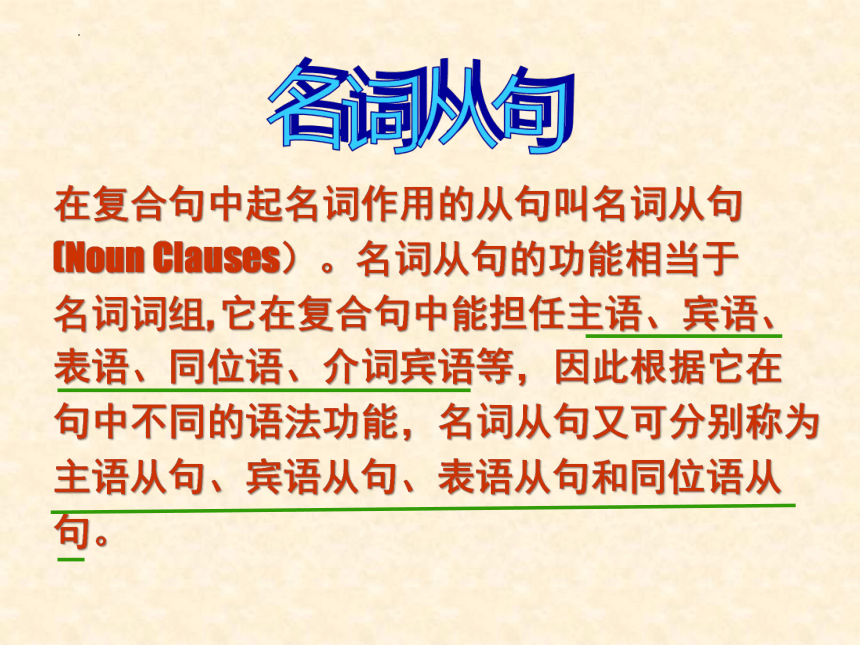

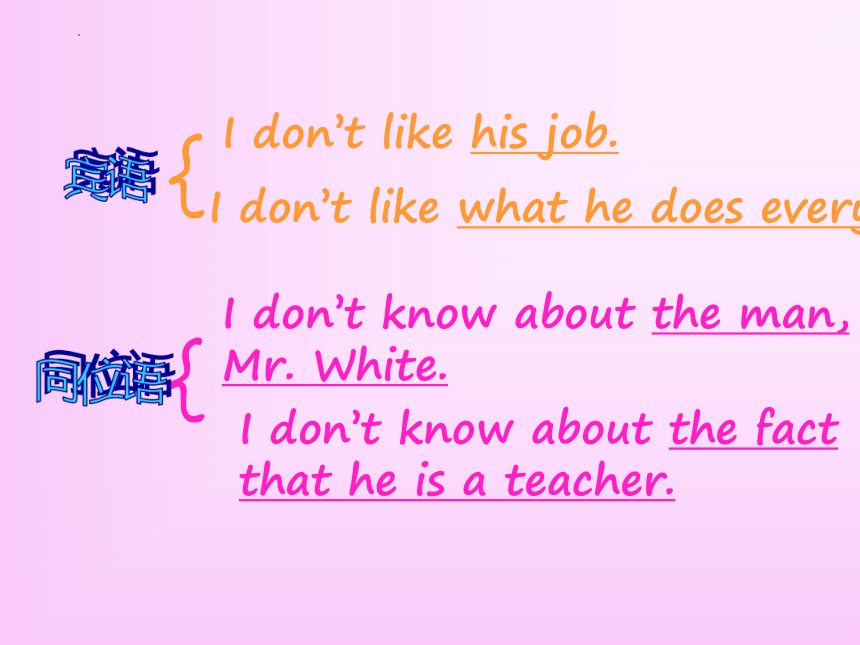
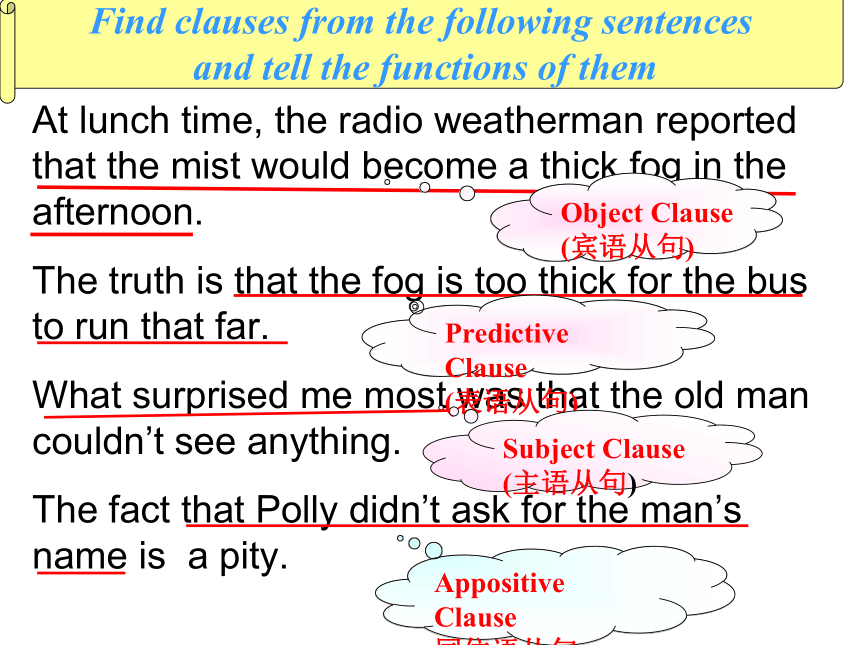
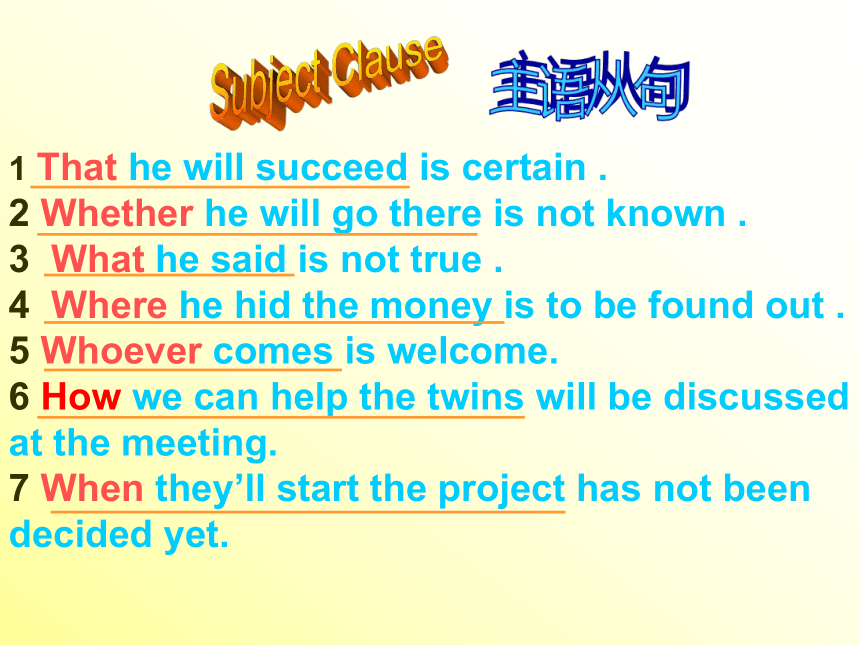

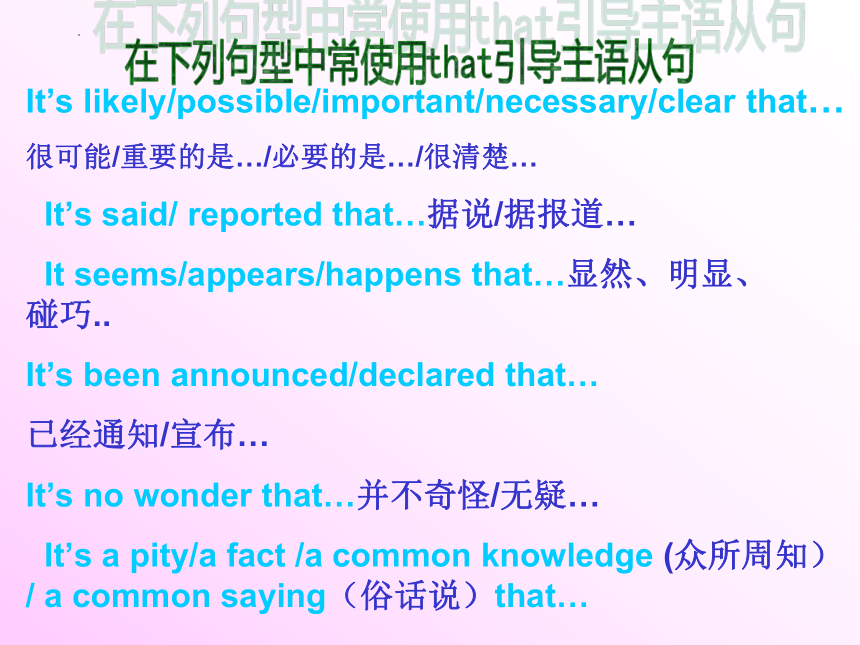
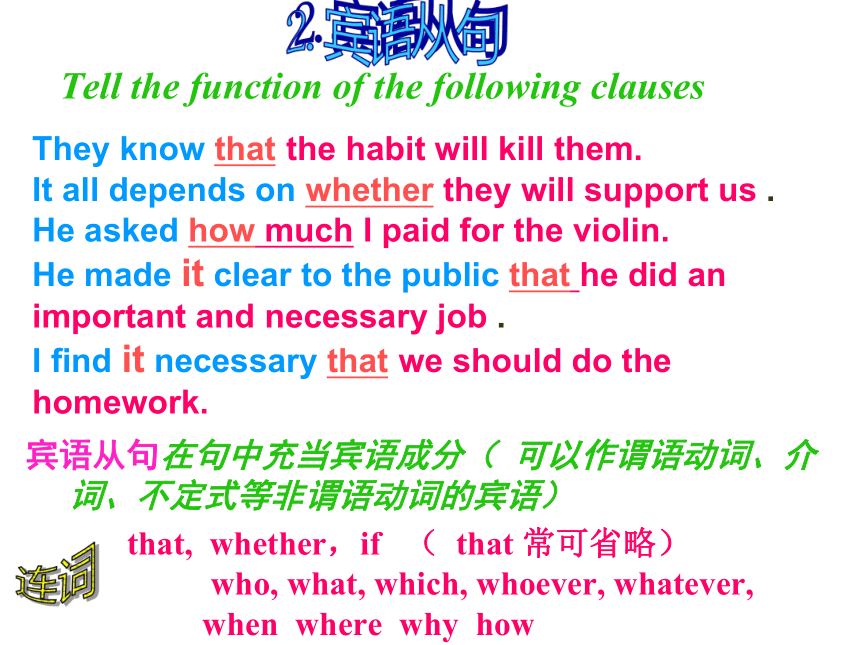
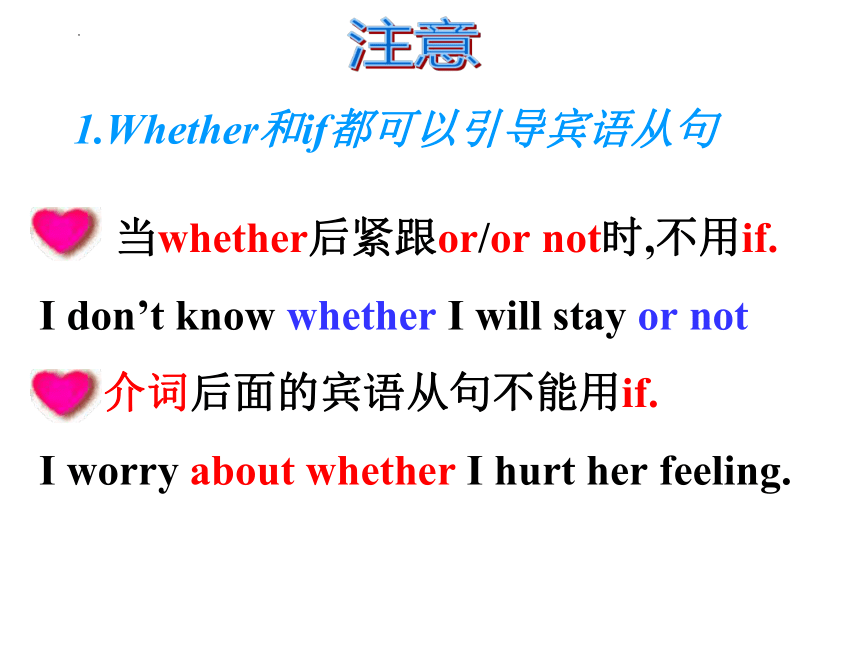
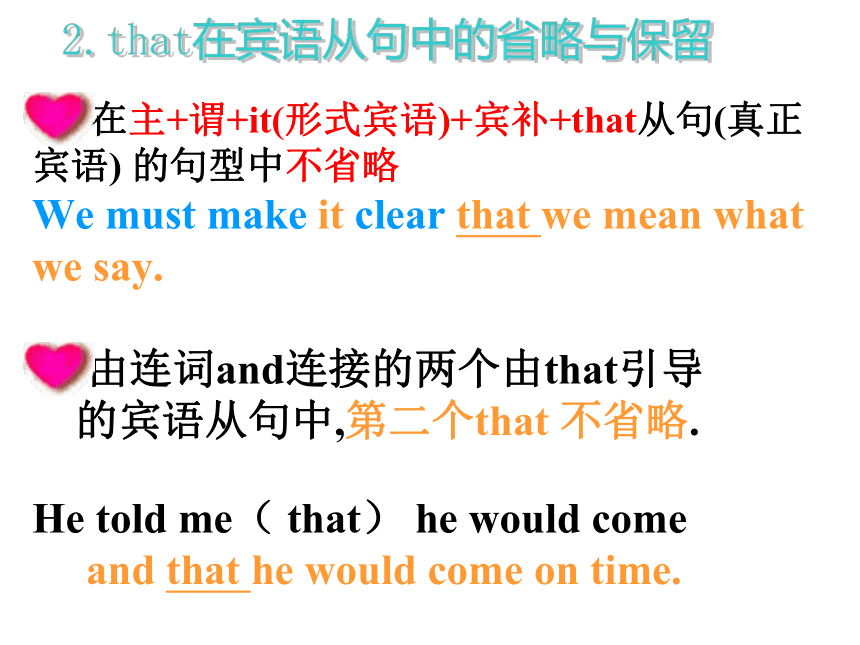
文档简介
(共43张PPT)
名词性从句
Grammar
Noun Clause
Can you distinguish THAT-CLAUSE in the two sentences
1.We expressed the hope that they had expressed.
2. We expressed the hope that they would come to China again.
在复合句中起名词作用的从句叫名词从句
(Noun Clauses)。名词从句的功能相当于
名词词组, 它在复合句中能担任主语、宾语、
表语、同位语、介词宾语等,因此根据它在
句中不同的语法功能,名词从句又可分别称为
主语从句、宾语从句、表语从句和同位语从句。
名词从句
His job is important.
What he does is important.
This is his job.
This is what he does every day.
{
{
名词性从句在功能上相当于名词
主语
表语
I don’t like his job.
I don’t like what he does every day.
{
I don’t know about the man, Mr. White.
I don’t know about the fact that he is a teacher.
{
同位语
宾语
At lunch time, the radio weatherman reported that the mist would become a thick fog in the afternoon.
The truth is that the fog is too thick for the bus to run that far.
What surprised me most was that the old man couldn’t see anything.
The fact that Polly didn’t ask for the man’s name is a pity.
Predictive Clause
(表语从句)
Object Clause
(宾语从句)
Subject Clause
(主语从句)
Appositive Clause
同位语从句
Find clauses from the following sentences
and tell the functions of them
1 That he will succeed is certain .
2 Whether he will go there is not known .
3 What he said is not true .
4 Where he hid the money is to be found out .
5 Whoever comes is welcome.
6 How we can help the twins will be discussed at the meeting.
7 When they’ll start the project has not been decided yet.
Subject Clause
主语从句
“It” is used as empty subject
形式主语
为避免主语冗长,句子头重脚轻,经常用it作形式主语,主语从句放在后面作真正的主语.
1.It is certain that he will succeed.
2.It is not known whether he will go there.
3.It has not been decided yet when they’ll start the project.
It’s likely/possible/important/necessary/clear that…
很可能/重要的是…/必要的是…/很清楚…
It’s said/ reported that…据说/据报道…
It seems/appears/happens that…显然、明显、 碰巧..
It’s been announced/declared that…
已经通知/宣布…
It’s no wonder that…并不奇怪/无疑…
It’s a pity/a fact /a common knowledge (众所周知) / a common saying(俗话说)that…
在下列句型中常使用that引导主语从句
宾语从句在句中充当宾语成分( 可以作谓语动词、介词、不定式等非谓语动词的宾语)
They know that the habit will kill them.
It all depends on whether they will support us .
He asked how much I paid for the violin.
He made it clear to the public that he did an important and necessary job .
I find it necessary that we should do the homework.
Tell the function of the following clauses
2.宾语从句
that, whether,if ( that 常可省略)
who, what, which, whoever, whatever,
when where why how
连词
当whether后紧跟or/or not时,不用if.
I don’t know whether I will stay or not
介词后面的宾语从句不能用if.
I worry about whether I hurt her feeling.
注意
1.Whether和if都可以引导宾语从句
在主+谓+it(形式宾语)+宾补+that从句(真正宾语) 的句型中不省略
We must make it clear that we mean what we say.
由连词and连接的两个由that引导
的宾语从句中,第二个that 不省略.
He told me( that) he would come
and that he would come on time.
2.that在宾语从句中的省略与保留
The question is whether we can rely on him.
That’s because we were in need of money at that time .
He looked as if he was going to cry .
That’s why I was late .
表语从句:在句中充当表语成分,一般放在连系动词之后.
作用:对主语进行解释说明。
表语从句
连接词
when / where / why / how / because
that / whether /as if /as though( if 不引导表语从句)
连接代词:
who / whom / whose / which / what
连接副词
同位语从句在句中充当同位语成分,其一般跟在一些抽象名词( idea ;belief ; fact ; truth ;problem ;news 等)后面,对名词作进一步解释说明.
同位语从句常用 that 引导或用连接副词when / where/why / how / whether
1) The idea that computers can recognize human voices surprises many people .
2) Word came that Napoleon himself was coming to inspect(视察) them .
3) Sydney kept his promise that he would always do anything he could for Lucie to make sure of her happiness.
同位语从句
1.Two thirds of all girls in Britain are on a diet./ The fact
worries their parents and teachers a lot.
2.The Queen of England was on a three-day visit in
China./ We heard the news last night.
_______
______________________________________________
The fact that two thirds of all girls are on a diet
worries their parents and teachers a lot.
_________
______________________________________________
______
We heard the news last night that the Queen of
England was on a three-day visit in China.
4.Time travel is possible./ There is no scientific proof for
the idea.
5.Chinese students should be given more free time./
The suggestion is welcomed by many people, especially
kids in school.
3.Teenagers should not spend too much time online./
Many British parents hold the view.
_______
Many British parents hold the view that teenagers
shouldn’t spend too much time online.
________
____________________
There is no scientific proof for the idea that time travel
is possible.
____________
__________________________________________
The suggestion that Chinese students should be given
more free time is welcomed by many people, especially
kids in school.
Useful Phrases
reduce pain
a scientific study
breath in
sniff pleasant smell
take the pain
be related to
be linked to
减少疼痛
一次科学研究
吸进
闻香味
忍受疼痛
与……相关
与……相联系
分析下列宾语从句中的连词
I don’t doubt (that )you will succeed.
I don’t know whether/if he will come tonight.
I doubt if /whether you will keep your promise.
3个句子中的连词that, whether, if (是否)在名词性从句中只起连接作用,在句中不担任成分,被称为连接词
注意:A. that 本身无意义,在宾语从句中可以省略,但在别的三种名词性从句中不可以省略。 B. whether 和if有是否的意义,在宾语从句中二者通常可以互换。但whether 可以用于所有的四种名词性从句,而if 仅可以用于宾语从句。
引导名词从句的关联词。
连接词
一、名词性从句的语序
(1) 名词性从句构成有两种
a. That + 陈述句
That light travels in straight lines is known to all.
This is what we are looking for.
名词性从句考点归纳
b. 疑问词+句子的剩余成分
(2) 疑问词引导的名词性从句要求使用陈述句
语序,不能用一般疑问句语序。
How was he successful is still a puzzle. ( )
How he was successful is still a puzzle. ( )
你能告诉我他住在什么地方吗?
F
T
T
F
他是怎么成功的仍然是个谜。
Could you tell me where he lives ( )
Could you tell me where does he live ( )
二、名词性从句连接词的选用
(1)that 和what 的选用
that 和 what 都可引导所有的名词从句。
但是,what除起连接作用外,还在名
词性从句中充当成分,可做从句的主
语、宾语、或表语。而that在名词性从
句中不充当任何成分,只起连接作用。
that / what
1.______ he wants is a book.
2. ______ he wants to go there is obvious.
3.The result is ______ we won the game.
4.This is _____ we want to know.
5.Is _____ he told us true
6.We should pay attention to ______ the teacher is saying.
7. I have no doubt _____ he will come.
8. I have no idea _____ he did that afternoon.
What
That
that
what
what
what
that
what
a. 主语从句
b. 表语从句
c. 同位语从句
e. 介词后的宾语从句
f. whether to do 做动词宾语不能用if to do.
g whether or not 连在一起引导宾语从句时不用if.
if 和whether 的选用
不能使用if 的情况:
1. I asked her __________ she had a bike.
2.______ we will hold a party in the open air
tomorrow depends on the weather.
3. We’re worried about ________ he is safe.
4. I don’t know ___________ he is well or not.
5. I don’t know ________ or not he is well.
6. The question is _________ he should do it.
7.The doctor can hardly answer the question
______ the old man will recover soon.
8. I don’t know _______ to go.
if / whether
Whether
whether
whether/if
whether
whether
whether
whether
if / whether
其它连接代词和副词的连用
主要根据名词性从句中的具体意义,正确的选择who、which、when、where、why、 how 等连接词,这些连接词既具有疑问含义,又起连接作用,同时在从句中充当各种成分。
我们何时举行运动会还没有决定。
________ we shall hold our sports meeting is
not decided.
我不知道昨天谁打破了玻璃。
I don’t know _________ broke the glass yesterday.
我不知道他长的什么样子。
I have no idea _________ he looks like.
这就是我忘记眼镜的地方。
This is _________ I left my glasses.
When
who
what
where
that 可省略的情况:
that不可省略的情况:
主语从句
表语从句
同位语从句
用it做形式宾语的宾语从句
并列的宾语从句中的后几个从句的
引导词that 不能省略
引导词that 的省略
单个宾语从句中的that可省略
1.I don’t think ________ she is coming.
2.It is a pity ________ he has made such a mistake.
3.The reason is _________ he is careless .
4.The news ________ our team won the match
inspired us.
5.I don’t think it necessary _________ you should
read English aloud.
6.He told me __________ his father had died
and __________ he had to make a living alone.
(that)
that
that
that
that
(that)
that
that/ (that)
1.同位语从句的格式:
2.能接同位语从句的名词有:
3.连接词通常是that,也可根据含义选用
三、同位语从句的引导和辨别
n.+ 连接词 + 从句
order, belief, suggestion, advice ,information等
whether, what, when, where 等来引导同位语从句。
fact、idea, news,
1. I have no idea _________ he comes from.
2. He can’t answer the question ________ he
got the money.
3.He gave us many suggestions ________ we
should get up earlier and take more exercise.
4.I have no doubt ________ he will win.
5. I have some doubt ________ he will win.
where
how
that
that
whether
that/ whether / where/ how
1.定语从句是先行词的修饰语,它不涉及先行词的具体内容。定语从句中that不但起连接作用,而且在定语从句中充当一个句子成分,充当从句的宾语成分时可省略。
2.同位语从句对中心词的内容作进一步的解释和说明,表明中心词的具体内容。引导同位语从句的that 在同位语从句中不做任何成分,只起连接作用,无具体含义,且不可省略.
同位语从句和定语从句的区别
1.We expressed the hope that they had expressed.
2. We expressed the hope that they would come
to China again.
1.The information has been announced that more middle school graduates will be admitted into university.
2.The information that he revealed at the meeting is of great value.
AT
AP
AP
AT
Attributive or Appositive
He gave me a suggestion that I ( should ) be calm now.
名词demand, suggestion, proposal, advice
等词后的同位语从句的语气要用虚拟语气,
结构为 should + do, should 可省略
a .他相信他的梦想总有一天会实现的.
He believes _________________________ .
b .请告诉我你昨天这个时候在干什么.
Please tell me _________________________.
his dream will come true some day
what you were doing at this time
yesterday
宾语从句的时态呼应
1. 如果主句时态是现在时或将来时,从句谓语
可根据句意需要而选用任一种时态.
他告诉我他正在为考试做准备。
He told me ________________________________ .
他说他已离开家乡十年了。
He told me _________________________________.
老师告诉我们光是沿直线运行的。
The teacher told us _________________________.
he was preparing for the examination
he had been away from his hometown
for ten years
light travels in a straight line.
2. 如果主句谓语是过去时,从句谓语动词一般用过去的
某种时态,但从句表达的是客观事实、真理、自然规
律等时,从句谓语通常用一般现在时。
1.The reason ______ we didn't trust him was ______ he often lied.
2.The reason ____ he gave for his absent was ______ he was ill.
reason 后面的表语从句只能用that 引导, 不能用why 引导, 但reason后面的定语从句可以用why 或者that 引导。
在名词性从句中,我们还须特别注意以下问题:
why
that
that
that
Practice time
Part A and Part B at page 11
have anything to do with
overall health
make the most of
misuse our senses
ignore our sense of touch
rather than
wear a nightshirt
be pleasant to touch
sleep deeply
give sb. chance to do sth.
与…有任何关系
全身健康
充分利用
误用我们的器官
忽视我们的触觉
而不是/胜过
穿着睡衣
手感好
睡得深
给某人机会做某事
Language Points
at the North Pole
make one’s way to
get to my destination
walk through the thick snow
become worse
It is/becomes impossible to do sth.
lose sight of
continue walking
sweat with fear
在北极
朝某地走去
到达我的目的地
走过厚厚的积雪
变得更糟
做某事不可能
看不见
继续跑
害怕得出汗
Thank you
名词性从句
Grammar
Noun Clause
Can you distinguish THAT-CLAUSE in the two sentences
1.We expressed the hope that they had expressed.
2. We expressed the hope that they would come to China again.
在复合句中起名词作用的从句叫名词从句
(Noun Clauses)。名词从句的功能相当于
名词词组, 它在复合句中能担任主语、宾语、
表语、同位语、介词宾语等,因此根据它在
句中不同的语法功能,名词从句又可分别称为
主语从句、宾语从句、表语从句和同位语从句。
名词从句
His job is important.
What he does is important.
This is his job.
This is what he does every day.
{
{
名词性从句在功能上相当于名词
主语
表语
I don’t like his job.
I don’t like what he does every day.
{
I don’t know about the man, Mr. White.
I don’t know about the fact that he is a teacher.
{
同位语
宾语
At lunch time, the radio weatherman reported that the mist would become a thick fog in the afternoon.
The truth is that the fog is too thick for the bus to run that far.
What surprised me most was that the old man couldn’t see anything.
The fact that Polly didn’t ask for the man’s name is a pity.
Predictive Clause
(表语从句)
Object Clause
(宾语从句)
Subject Clause
(主语从句)
Appositive Clause
同位语从句
Find clauses from the following sentences
and tell the functions of them
1 That he will succeed is certain .
2 Whether he will go there is not known .
3 What he said is not true .
4 Where he hid the money is to be found out .
5 Whoever comes is welcome.
6 How we can help the twins will be discussed at the meeting.
7 When they’ll start the project has not been decided yet.
Subject Clause
主语从句
“It” is used as empty subject
形式主语
为避免主语冗长,句子头重脚轻,经常用it作形式主语,主语从句放在后面作真正的主语.
1.It is certain that he will succeed.
2.It is not known whether he will go there.
3.It has not been decided yet when they’ll start the project.
It’s likely/possible/important/necessary/clear that…
很可能/重要的是…/必要的是…/很清楚…
It’s said/ reported that…据说/据报道…
It seems/appears/happens that…显然、明显、 碰巧..
It’s been announced/declared that…
已经通知/宣布…
It’s no wonder that…并不奇怪/无疑…
It’s a pity/a fact /a common knowledge (众所周知) / a common saying(俗话说)that…
在下列句型中常使用that引导主语从句
宾语从句在句中充当宾语成分( 可以作谓语动词、介词、不定式等非谓语动词的宾语)
They know that the habit will kill them.
It all depends on whether they will support us .
He asked how much I paid for the violin.
He made it clear to the public that he did an important and necessary job .
I find it necessary that we should do the homework.
Tell the function of the following clauses
2.宾语从句
that, whether,if ( that 常可省略)
who, what, which, whoever, whatever,
when where why how
连词
当whether后紧跟or/or not时,不用if.
I don’t know whether I will stay or not
介词后面的宾语从句不能用if.
I worry about whether I hurt her feeling.
注意
1.Whether和if都可以引导宾语从句
在主+谓+it(形式宾语)+宾补+that从句(真正宾语) 的句型中不省略
We must make it clear that we mean what we say.
由连词and连接的两个由that引导
的宾语从句中,第二个that 不省略.
He told me( that) he would come
and that he would come on time.
2.that在宾语从句中的省略与保留
The question is whether we can rely on him.
That’s because we were in need of money at that time .
He looked as if he was going to cry .
That’s why I was late .
表语从句:在句中充当表语成分,一般放在连系动词之后.
作用:对主语进行解释说明。
表语从句
连接词
when / where / why / how / because
that / whether /as if /as though( if 不引导表语从句)
连接代词:
who / whom / whose / which / what
连接副词
同位语从句在句中充当同位语成分,其一般跟在一些抽象名词( idea ;belief ; fact ; truth ;problem ;news 等)后面,对名词作进一步解释说明.
同位语从句常用 that 引导或用连接副词when / where/why / how / whether
1) The idea that computers can recognize human voices surprises many people .
2) Word came that Napoleon himself was coming to inspect(视察) them .
3) Sydney kept his promise that he would always do anything he could for Lucie to make sure of her happiness.
同位语从句
1.Two thirds of all girls in Britain are on a diet./ The fact
worries their parents and teachers a lot.
2.The Queen of England was on a three-day visit in
China./ We heard the news last night.
_______
______________________________________________
The fact that two thirds of all girls are on a diet
worries their parents and teachers a lot.
_________
______________________________________________
______
We heard the news last night that the Queen of
England was on a three-day visit in China.
4.Time travel is possible./ There is no scientific proof for
the idea.
5.Chinese students should be given more free time./
The suggestion is welcomed by many people, especially
kids in school.
3.Teenagers should not spend too much time online./
Many British parents hold the view.
_______
Many British parents hold the view that teenagers
shouldn’t spend too much time online.
________
____________________
There is no scientific proof for the idea that time travel
is possible.
____________
__________________________________________
The suggestion that Chinese students should be given
more free time is welcomed by many people, especially
kids in school.
Useful Phrases
reduce pain
a scientific study
breath in
sniff pleasant smell
take the pain
be related to
be linked to
减少疼痛
一次科学研究
吸进
闻香味
忍受疼痛
与……相关
与……相联系
分析下列宾语从句中的连词
I don’t doubt (that )you will succeed.
I don’t know whether/if he will come tonight.
I doubt if /whether you will keep your promise.
3个句子中的连词that, whether, if (是否)在名词性从句中只起连接作用,在句中不担任成分,被称为连接词
注意:A. that 本身无意义,在宾语从句中可以省略,但在别的三种名词性从句中不可以省略。 B. whether 和if有是否的意义,在宾语从句中二者通常可以互换。但whether 可以用于所有的四种名词性从句,而if 仅可以用于宾语从句。
引导名词从句的关联词。
连接词
一、名词性从句的语序
(1) 名词性从句构成有两种
a. That + 陈述句
That light travels in straight lines is known to all.
This is what we are looking for.
名词性从句考点归纳
b. 疑问词+句子的剩余成分
(2) 疑问词引导的名词性从句要求使用陈述句
语序,不能用一般疑问句语序。
How was he successful is still a puzzle. ( )
How he was successful is still a puzzle. ( )
你能告诉我他住在什么地方吗?
F
T
T
F
他是怎么成功的仍然是个谜。
Could you tell me where he lives ( )
Could you tell me where does he live ( )
二、名词性从句连接词的选用
(1)that 和what 的选用
that 和 what 都可引导所有的名词从句。
但是,what除起连接作用外,还在名
词性从句中充当成分,可做从句的主
语、宾语、或表语。而that在名词性从
句中不充当任何成分,只起连接作用。
that / what
1.______ he wants is a book.
2. ______ he wants to go there is obvious.
3.The result is ______ we won the game.
4.This is _____ we want to know.
5.Is _____ he told us true
6.We should pay attention to ______ the teacher is saying.
7. I have no doubt _____ he will come.
8. I have no idea _____ he did that afternoon.
What
That
that
what
what
what
that
what
a. 主语从句
b. 表语从句
c. 同位语从句
e. 介词后的宾语从句
f. whether to do 做动词宾语不能用if to do.
g whether or not 连在一起引导宾语从句时不用if.
if 和whether 的选用
不能使用if 的情况:
1. I asked her __________ she had a bike.
2.______ we will hold a party in the open air
tomorrow depends on the weather.
3. We’re worried about ________ he is safe.
4. I don’t know ___________ he is well or not.
5. I don’t know ________ or not he is well.
6. The question is _________ he should do it.
7.The doctor can hardly answer the question
______ the old man will recover soon.
8. I don’t know _______ to go.
if / whether
Whether
whether
whether/if
whether
whether
whether
whether
if / whether
其它连接代词和副词的连用
主要根据名词性从句中的具体意义,正确的选择who、which、when、where、why、 how 等连接词,这些连接词既具有疑问含义,又起连接作用,同时在从句中充当各种成分。
我们何时举行运动会还没有决定。
________ we shall hold our sports meeting is
not decided.
我不知道昨天谁打破了玻璃。
I don’t know _________ broke the glass yesterday.
我不知道他长的什么样子。
I have no idea _________ he looks like.
这就是我忘记眼镜的地方。
This is _________ I left my glasses.
When
who
what
where
that 可省略的情况:
that不可省略的情况:
主语从句
表语从句
同位语从句
用it做形式宾语的宾语从句
并列的宾语从句中的后几个从句的
引导词that 不能省略
引导词that 的省略
单个宾语从句中的that可省略
1.I don’t think ________ she is coming.
2.It is a pity ________ he has made such a mistake.
3.The reason is _________ he is careless .
4.The news ________ our team won the match
inspired us.
5.I don’t think it necessary _________ you should
read English aloud.
6.He told me __________ his father had died
and __________ he had to make a living alone.
(that)
that
that
that
that
(that)
that
that/ (that)
1.同位语从句的格式:
2.能接同位语从句的名词有:
3.连接词通常是that,也可根据含义选用
三、同位语从句的引导和辨别
n.+ 连接词 + 从句
order, belief, suggestion, advice ,information等
whether, what, when, where 等来引导同位语从句。
fact、idea, news,
1. I have no idea _________ he comes from.
2. He can’t answer the question ________ he
got the money.
3.He gave us many suggestions ________ we
should get up earlier and take more exercise.
4.I have no doubt ________ he will win.
5. I have some doubt ________ he will win.
where
how
that
that
whether
that/ whether / where/ how
1.定语从句是先行词的修饰语,它不涉及先行词的具体内容。定语从句中that不但起连接作用,而且在定语从句中充当一个句子成分,充当从句的宾语成分时可省略。
2.同位语从句对中心词的内容作进一步的解释和说明,表明中心词的具体内容。引导同位语从句的that 在同位语从句中不做任何成分,只起连接作用,无具体含义,且不可省略.
同位语从句和定语从句的区别
1.We expressed the hope that they had expressed.
2. We expressed the hope that they would come
to China again.
1.The information has been announced that more middle school graduates will be admitted into university.
2.The information that he revealed at the meeting is of great value.
AT
AP
AP
AT
Attributive or Appositive
He gave me a suggestion that I ( should ) be calm now.
名词demand, suggestion, proposal, advice
等词后的同位语从句的语气要用虚拟语气,
结构为 should + do, should 可省略
a .他相信他的梦想总有一天会实现的.
He believes _________________________ .
b .请告诉我你昨天这个时候在干什么.
Please tell me _________________________.
his dream will come true some day
what you were doing at this time
yesterday
宾语从句的时态呼应
1. 如果主句时态是现在时或将来时,从句谓语
可根据句意需要而选用任一种时态.
他告诉我他正在为考试做准备。
He told me ________________________________ .
他说他已离开家乡十年了。
He told me _________________________________.
老师告诉我们光是沿直线运行的。
The teacher told us _________________________.
he was preparing for the examination
he had been away from his hometown
for ten years
light travels in a straight line.
2. 如果主句谓语是过去时,从句谓语动词一般用过去的
某种时态,但从句表达的是客观事实、真理、自然规
律等时,从句谓语通常用一般现在时。
1.The reason ______ we didn't trust him was ______ he often lied.
2.The reason ____ he gave for his absent was ______ he was ill.
reason 后面的表语从句只能用that 引导, 不能用why 引导, 但reason后面的定语从句可以用why 或者that 引导。
在名词性从句中,我们还须特别注意以下问题:
why
that
that
that
Practice time
Part A and Part B at page 11
have anything to do with
overall health
make the most of
misuse our senses
ignore our sense of touch
rather than
wear a nightshirt
be pleasant to touch
sleep deeply
give sb. chance to do sth.
与…有任何关系
全身健康
充分利用
误用我们的器官
忽视我们的触觉
而不是/胜过
穿着睡衣
手感好
睡得深
给某人机会做某事
Language Points
at the North Pole
make one’s way to
get to my destination
walk through the thick snow
become worse
It is/becomes impossible to do sth.
lose sight of
continue walking
sweat with fear
在北极
朝某地走去
到达我的目的地
走过厚厚的积雪
变得更糟
做某事不可能
看不见
继续跑
害怕得出汗
Thank you
